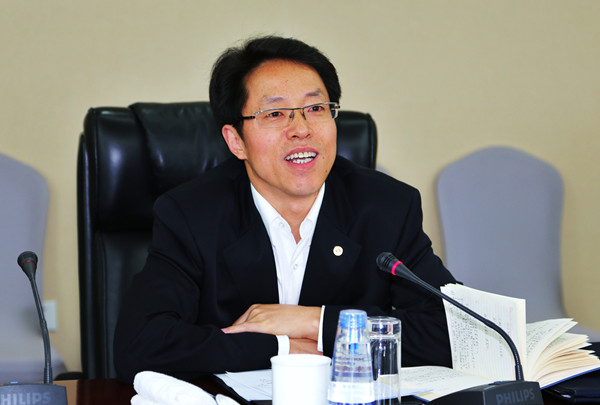Former judge and chief executive contender Woo Kwok-hing has said that the China Liaison Office should not interfere in or comment on Hong Kong internal affairs because it would contravene the territory’s mini-constitution.
The China Liaison Office – Beijing’s representative organ in the territory – has been criticised for interfering in Hong Kong affairs by frequently commenting on issues such as the independence movement and the Mong Kok clashes in February.

‘Inappropriate to comment’
Woo said in a Commercial Radio programme on Friday that if he became the chief executive, he would not let the Liaison Office speak about Hong Kong affairs.
“I guess they will inform me before making public statements. I will tell them not to say anything, because it is not appropriate under the law,” Woo said.
He added: “I’m not saying they are wrong, but it will not look good in the public eye. If they want to comment on matters relating to the [policy of One Country] Two Systems, please let me know first.”
The retired judge said that the Basic Law stipulates that China’s “established basic policies” regarding Hong Kong – including the One Country, Two Systems principle – shall not be contravened. It is therefore not appropriate for Chinese officials to make any statements on Hong Kong affairs. “Even just commenting would raise suspicion,” he said.

‘No meddling in local elections’
It is a common – though controversial – practice for the chief executive and pro-Beijing lawmakers to visit the Liaison Office after being elected to office, to thank the Chinese officials for backing them. Asked if he will do the same if he is elected, Woo said: “Wouldn’t that mean the China Liaison Office meddles in Hong Kong elections?”
Woo said that “out of courtesy,” he had informed the China Liaison Office before announcing his intention to run for Hong Kong’s top job, but has not received any response from Beijing regarding his candidacy.
He added that he does not know the Office’s director Zhang Xiaoming in person. Zhang, a powerful Chinese official in the territory, is believed to have close ties with the incumbent Leung Chun-ying.

Only Woo has publicly expressed his intent to run for Hong Kong’s top job so far. But local media have reported that Beijing currently has a list of ten politicians interested in joining the race. Financial Secretary John Tsang is also tipped to run.
Woo said he did not understand why other politicians interested in running for chief executive have not announced their intention yet. “It is illogical. I don’t understand what they are waiting for,” he said.
Woo also criticised Beijing’s violent crackdown on the Tiananmen Square student-led protests in 1989, saying that the authorities should have met with the student protesters and sought a solution. He holds a similar position regarding the Hong Kong government’s use of tear gas against pro-democracy protesters in 2014.
None of the Chief Executive Election Committee members have openly expressed support for Woo yet. Woo said that political parties will not make any public endorsement at this stage, but he said if the legal sector of the Election Committee did not nominate him, he would be disappointed.
The election for the Election Committee will be held on December 11 to select 1,044 out of the 1,200 committee members responsible for electing the next chief executive.
